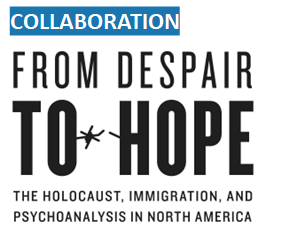
A Collaboration with the Freud Museum Vienna and the Erikson Institute of the Austen Riggs Center
Roundtable 1: After Vienna: A Conversation with Otto Kernberg, MD and Thomas Kohut, PhD (Recording)
The opening roundtable examined the experiences two prominent psychoanalysts, Otto Kernberg and Heinz Kohut who were forced to emigrate from Vienna as the Holocaust approached. Dr. Kernberg spoke about his life and career considering his emigration experience, and Tom Kohut, PhD, spoke about how the emigration experience of his father Heinz Kohut influenced his personal and professional life and work. How both men have shaped American psychoanalysis was examined. This discussion was moderated by Nancy McWilliams, PhD.
Roundtable 2: Refugee Psychoanalysts 1920-1955: Enriching Psychoanalysis in the Americas
The second roundtable examined the experience of emigrant analysts in the United States and the history of forced migration of psychoanalysts from Europe.
Roundtable 3: Genocide: What Psychoanalysis Lost in the Holocaust
In this third roundtable, panelists discussed what was lost when entire institutes were destroyed through emigration, war, and genocide. While some institutes like the Vienna Psychoanalytic Society were re-established, the roundtable looked at the ways the individuals, their families, organizations, and the field grappled with loss and death in the post-war period.
Roundtable 4: Beyond Forced Emigration: Contemporary Émigré Experience in Psychoanalysis
The field of psychoanalysis in the 21st century has been shaped by the history of emigration in the 20th century—this fourth panel looks at the way that today’s immigrant psychoanalysts experience identity, otherness, and place and how those histories will continue to change the field.
These roundtables are part of "From Despair to Hope: The Holocaust, Immigration, and Psychoanalysis in North America," a collaboration between the Erikson Institute of the Austen Riggs Center and the Sigmund Freud Museum honoring the late Anton O. Kris, MD.
This program is supported in part by Steven C. Ackerman and grants from the Stockbridge Cultural Council and the Lee Cultural Council, local agencies that are supported by the Mass Cultural Council, a state agency.

 Facebook
Facebook X
X LinkedIn
LinkedIn Forward
Forward